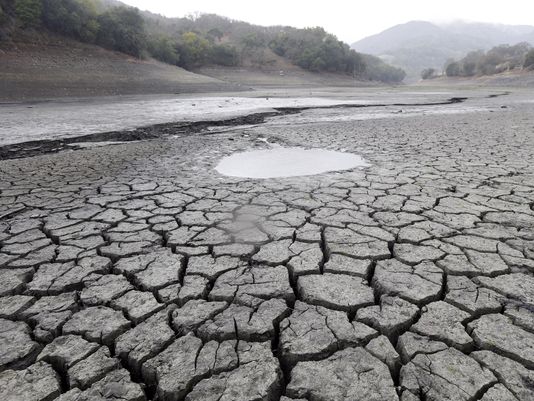The Los Angeles Times reports that the state may try to capitalize on the current drought by taking the unprecedented step of regulating groundwater use. Assemblyman Roger Dickinson (D-Sacramento), one of the creators of the legislation, said of its new chances for passage: “This falls under the category of: Never let a crisis go to waste.”
UC Davis reported that California’s drought cost the state $2.2 billion, and that was less than it could have been because of the state’s increased reliance on groundwater. That extra water covered as much as 75% of the water that had been lost.
However, because the drought has precipitated the increased withdrawal of water from underground basins, primarily in the San Joaquin Valley, the rate at which it is being drawn means more is taken than can be replaced.
Lester Snow, director of the nonprofit group California Water Foundation and a former state secretary for natural resources, explained, “What we’re doing with groundwater is an equivalent to deficit spending. Something bad is going to happen [in the long run.]”
The legislation proposed flies in the face of the traditional perspective of groundwater belonging to the property owner. However, there have already been changes to the prevailing attitude; some water districts are supervising their underground sources; some others were forced to do so by court proceedings. Yet some important basins are unregulated.
The proposed legislation, reflected in two separate but identical bills, would force local agencies to originate a scheme to address the supervision of their groundwater by 2020. State Sen. Fran Pavley (D-Agoura Hills), who wrote one of the bills, said, “We do recognize that local management is by far preferable.”
Brown’s office helped with creating the proposal, which makes it more likely to become a reality. According to the Times California is the only Western state that has not regulated groundwater.
Dave Puglia, a senior vice president of Western Growers Association, said, “California hasn’t attempted to change water law this dramatically in 100 years.”
Some agricultural groups are still wary of state interference, especially as the drought has forced the increased use of groundwater for their crops. They are also concerned about the potential effect on property values. Puglia said, “If the legislation enacted creates even a perception of a loss of access to the groundwater that was accessible before, my land value goes down.”
Western Growers Association is willing to negotiate with the state; they say they want restrictions on how involved the state will be with local plans. But their willingness to negotiate enthuses those in favor of the legislation, and further support has come from the Association of California Water Districts, whose executive director, Tim Quinn, said, “Ten years ago, we were for local control [of groundwater resources] no matter what. Now, we’re for local control — so long as the locals are managing responsibly.”

COMMENTS
Please let us know if you're having issues with commenting.